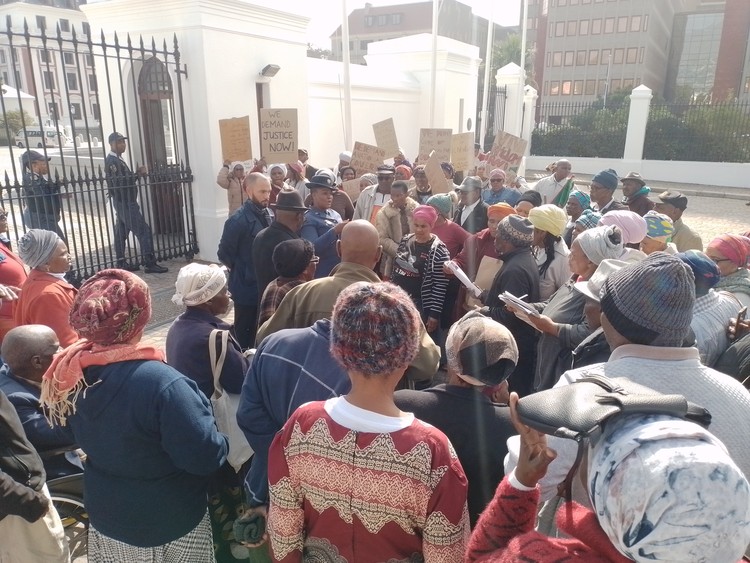We want reparations before the elections, demand victims of apartheid crime
About 100 pensioners, supported by the Khulumani Support Group, picketed outside Parliament on Tuesday
Members of the Khulumani Support Group in Cape Town picketed outside Parliament on Tuesday. They say they will not vote if the government continues to ignore them. Photo: Sandiso Phaliso
About 100 pensioners, supported by the Khulumani Support Group, picketed outside Parliament on Tuesday, demanding reparations from the Department of Justice for crimes committed during apartheid.
Members of Khulumani say they will not vote in the 2024 elections if reparations are not paid.
Carrying placards reading “We demand answers now” and “No reparations, no vote”, the picketers said they are frustrated with having to wait to be compensated by the government as victims of apartheid.
The protests have been going on intermittently for years, with many protesters camping outside the Constitutional Court in Johannesburg.
The Khulumani group was set up in 1996 to represent and support over 100,000 victims of apartheid crimes and their families. The Truth and Reconciliation Commission (TRC) – tasked with finding and compensating eligible victims and their families – had initially listed about 21,000 people. This was later cut down to 17,000 people eligible for reparations.
According to the President’s Fund, which is mandated to pay out reparations, everyone who applied and was found eligible has received the R30,000 grant, except for 13 people, seven of whom are confirmed to be living overseas. But the protesters say millions of rands still in the Fund are owed to them.
According to the Khulumani Support Group chairperson in Philippi, Cape Town, Sindiswa Nunu, many members have died waiting for reparations.
“We are sent back and forth without any explanations. We are not asking but demanding the reparations before the elections. The money is there,” said Nunu.
She said many of them had been tortured by the apartheid government, their houses had been burnt and they had spent months in custody without seeing a judge. “We still have the scars,” she said.
Khulumani Support Group member Mzuvukile Thangana said he still had a bullet lodged in his body after being shot by apartheid police in the early 1980s. He said he is constantly sick and does not have money to cover all of his medical bills.
“It’s such a shame that we have to wait for almost three decades to be compensated. Close to nothing has been done,” he said.
An official from the Office of the Presidency, Levert Solomons, came to accept the memorandum, but said he could not comment on the matter.
Next: Three Cape Town SAPS officers appear in court for torture of barber
Previous: No public transport relief in sight for Tongaat workers as PRASA passes the buck
© 2024 GroundUp. This article is licensed under a Creative Commons Attribution-NoDerivatives 4.0 International License.
You may republish this article, so long as you credit the authors and GroundUp, and do not change the text. Please include a link back to the original article.
We put an invisible pixel in the article so that we can count traffic to republishers. All analytics tools are solely on our servers. We do not give our logs to any third party. Logs are deleted after two weeks. We do not use any IP address identifying information except to count regional traffic. We are solely interested in counting hits, not tracking users. If you republish, please do not delete the invisible pixel.



